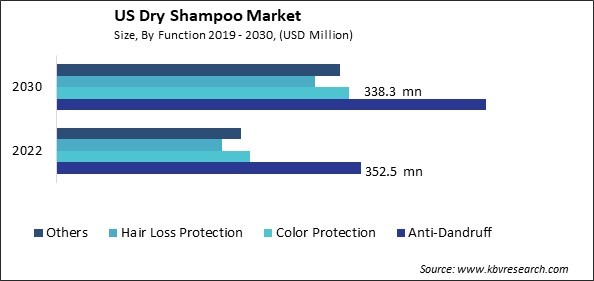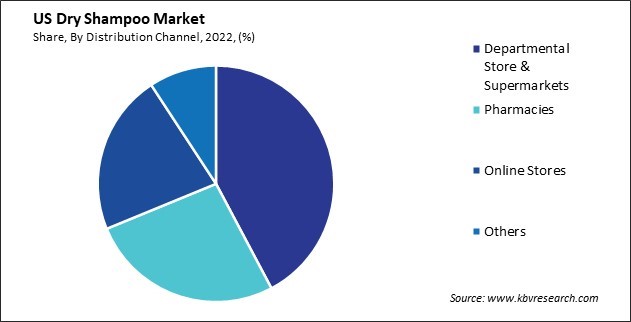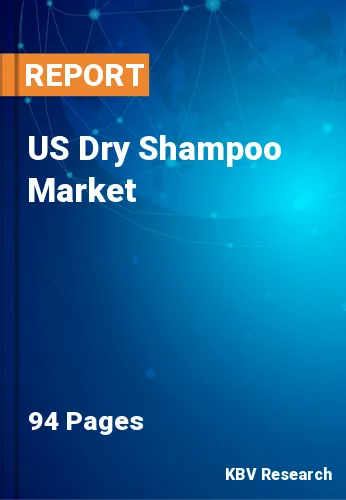The USA Dry Shampoo Market size is expected to reach $1.5 billion by 2030, rising at a market growth of 5.2% CAGR during the forecast period. In the year 2022, the market attained a volume of 54,668.2 thousand units (100 ml) experiencing a growth of 5.2% (2019-2022).
The dry shampoo market in the United States is experiencing a paradigm shift driven by convenience and customization. Dry shampoo has become a revolutionary solution in contemporary consumers' fast-paced, on-the-go lifestyles, providing an efficient substitute to conventional hair washing. The convenience factor is paramount, addressing the time-consuming nature of wet washing and resonating with individuals across diverse demographics, including busy professionals, students, and avid travelers.

The trend towards natural and sustainable ingredients is gaining traction, aligning with the broader movement toward clean beauty and eco-conscious consumer choices. Brands are responding by formulating dry shampoos with ingredients perceived as clean, environmentally friendly, and free from harsh chemicals. This reflects a growing awareness among U.S. consumers regarding the impact of their beauty choices on both personal well-being and the environment.
In the U.S., the rise of specialty ingredients in dry shampoos addresses specific hair concerns such as volumizing, texturizing, or providing extra hydration. Brands are introducing innovative formulations beyond traditional oil-absorbing properties, offering a comprehensive approach to hair care. This trend aligns with consumers' evolving expectations, emphasizing multi-functional products that deliver targeted results. As U.S. consumers become more discerning and ingredient-conscious, brands leverage these preferences as a point of differentiation. Marketing strategies in the U.S. often highlight the unique formulations and specialty ingredients used in dry shampoos, emphasizing the benefits of a more tailored and sophisticated approach to hair care.
As health-conscious consumer trends rise, pharmaceutical industry messages regarding safety and health could indirectly influence preferences for gentle and non-harmful dry shampoo market choices, aligning with the evolving demands in the United States. Recommendations from dermatologists associated with pharmaceutical firms and the integration of clinically researched ingredients may impact the formulation and marketing of dry shampoos.
According to the International Trade Administration, the U.S. cosmetics industry is vibrant and fast evolving, with thousands of small and medium firms engaged in product and ingredient research and development, manufacturing, marketing, distribution, and retail sales via traditional and online channels. From 2017 to 2019, U.S. exports grew by two percent annually to reach $15.02 billion. The largest cosmetics manufacturers are California, New Jersey, Florida, and Texas. This underscores the industry's adaptability to evolving consumer trends and ability to capitalize on a diverse range of domestic and international industries.
In the United States, the dry shampoo market thrives on the principles of convenience and catering to on-the-go lifestyles, reflecting a cultural shift towards time-efficient grooming solutions. With hectic schedules and an increasing emphasis on efficiency, consumers are turning to dry shampoos as a quick and convenient way to refresh their hair between traditional washes. This trend aligns seamlessly with the fast-paced American lifestyle, where individuals often seek practical solutions that save time without compromising personal care routines.
The dry shampoo market has emerged as a game-changing and time-saving solution for individuals leading fast-paced lives in the United States. This innovative hair care alternative enables people with busy schedules to refresh their hair without the necessity of a full wash and blow-dry. The simplicity of application and the rapid drying features make dry shampoos particularly well-suited for Americans who are on the go, whether heading to work, attending social events, or engaging in a workout session. This perfectly resonates with the American culture's emphasis on efficiency, delivering a grooming solution that seamlessly integrates into the daily routines of individuals navigating the hustle and bustle of U.S. lifestyles.
The U.S. industry has witnessed a surge in demand for portable and travel-friendly dry shampoo products, catering to the needs of individuals constantly on the move. Compact packaging and easy application methods contribute to the product's appeal, making it a go-to solution for maintaining hair cleanliness while navigating a hectic lifestyle. Thus, the thriving U.S. dry shampoo market reflects a cultural shift towards time-efficient grooming. Catering to busy lifestyles, portable and easy-to-use products meet the demand for on-the-go solutions. The industry's success lies in providing a quick, efficient, and adaptable grooming option for the modern American consumer.
The U.S. dry shampoo market demonstrates a notable diversity in formulations and specialty ingredients, catering to the preferences of a discerning consumer base. Responding to a demand for customization, manufacturers offer formulations tailored for various hair types, textures, and styling requirements. This diversity extends to specialized options for volumizing, color-treated, and sensitive hair, providing consumers with personalized choices. The introduction of specialty dry shampoos targeting specific needs, such as scalp health or color preservation, underscores the industry's commitment to addressing diverse U.S. consumer requirements. This approach allows individuals to tailor their grooming routines to align with their unique hair care concerns, reflecting the market's adaptability to the preferences of the American consumer.
The dynamic nature of the dry shampoo market in the U.S. is evident in the collaboration between the beauty and technology industries. Digital platforms and e-commerce play a crucial role in reaching and engaging consumers. Brands leverage online channels not only for product accessibility but also for educating consumers about the benefits of diverse formulations and the importance of sustainable practices, fostering a community of informed and empowered buyers.
The dry shampoo market in the United States also sees a growing interest in eco-friendly formulations with an emphasis on sustainability. Biodegradable ingredients and packaging resonate with environmentally conscious consumers, aligning with the broader trend of green beauty. Brands are prioritizing the reduction of their ecological footprint throughout the product lifecycle. Hence, the U.S. dry shampoo market's commitment to diversity and customization, addressing specific hair care needs, reflects its adaptability to the preferences of American consumers.

The dry shampoo market in the United States is fiercely competitive, characterized by a landscape where established players, innovative newcomers, and well-known beauty brands vie for U.S. consumer attention in a rapidly expanding and evolving segment. Key players such as Batiste, Living Proof, and Dove have long been synonymous with the dry shampoo market and have established a significant presence through effective marketing, product diversity, and consumer loyalty.
Batiste, a pioneer in the dry shampoo category, has solidified its position as an industry leader with an extensive range of offerings catering to various hair types and preferences. Known for its affordability and effective oil-absorbing formulations, Batiste has captured a diverse consumer base in the United States, from budget-conscious shoppers to those seeking quick and reliable solutions for on-the-go hair care.
Living Proof, renowned for its innovative approach to hair care, has brought its expertise to the dry shampoo market, offering products beyond oil absorption. With a focus on science-backed formulations, Living Proof caters to U.S. consumers looking for advanced solutions, such as dry shampoos designed for specific hair concerns like volume, texture, and overall hair health. Similarly, Dove, a household name in the beauty industry, has significantly leveraged its brand recognition to impact the dry shampoo market. Known for its inclusive approach, Dove offers a range of dry shampoos that address diverse hair types and textures, emphasizing nourishing and moisturizing properties.
In addition to these industry giants, new and niche players in the United States are making waves, introducing unique propositions to capture specific consumer segments. For instance, brands like Ouai and Amika have gained attention for their stylish packaging, emphasis on clean beauty, and formulations that prioritize effectiveness and aesthetic appeal.
Private-label and store brands from major retailers, including Walmart, Target, and CVS, further intensify the competition by offering their versions of dry shampoos. These products often combine affordability with the trust associated with established retail names, providing U.S. consumers with accessible options during their shopping trips. Brands like Acure and Love Beauty and Planet are gaining traction by incorporating eco-friendly packaging and natural ingredients into their dry shampoo formulations, appealing to environmentally conscious consumers.
By Function
By Distribution Channel
By End User
BY Type
Our team of dedicated experts can provide you with attractive expansion opportunities for your business.

